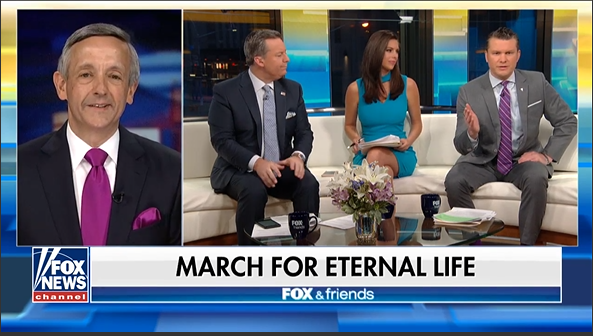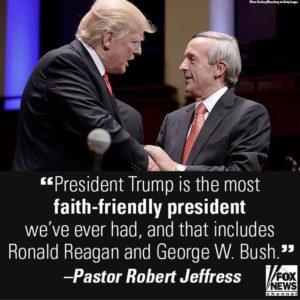On the heels of nationwide rallies calling for tougher gun laws, a Southern Baptist megachurch pastor and spiritual adviser to President Donald Trump suggested the real culprit behind school shootings is the separation of church and state.
“For the last 70 years, there has been a crusade by secularists to remove any acknowledgement of God from the public square, including our schools, saying that we can be good without God,” Robert Jeffress, pastor of First Baptist Church in Dallas, said March 25 on Fox News.
Jeffress, a member of President Trump’s evangelical faith advisory board and regular Fox News contributor, termed the removal of government-sponsored prayer and Bible reading in American public schools “a dismal failure.”
“For the first 150 years of our nation’s history, our school children prayed,” Jeffress said. “They read Scripture in school. They even memorized the Ten Commandments — including the commandment ‘thou shalt not kill.’ And yet about 60 years ago the Supreme Court says that’s unconstitutional.”
 While he did not say so specifically, Jeffress appeared to refer to two landmark Supreme Court decisions in the 1960s.
While he did not say so specifically, Jeffress appeared to refer to two landmark Supreme Court decisions in the 1960s.
In Engel v. Vitale, decided June 25, 1962, the high court ruled 6-1 that a New York law authorizing a short, voluntary prayer for recitation at the start of each school day violated the establishment of religion clause of the First Amendment to the U.S. Constitution.
Writing for the majority, associate Justice Hugo Black, a Baptist appointed by FDR, said neither the prayer’s nondenominational character nor its voluntary participation passed constitutional muster and that by sponsoring the prayer, New York officially approved religion.
A year later, June 17, 1963, in an 8-1 decision in School District of Abington Township v. Schempp, the Supreme Court struck down a Pennsylvania law requiring students to open each school day by reading at least 10 verses of the Bible and reciting the Lord’s Prayer.
Associate Justice Tom C. Clark, a Truman appointee, said even though students could be excused with a written note from their parents, the exercises still flouted the First Amendment’s ban on establishment of religion, applicable to the states under the 14th Amendment.
Baptist state paper editorials at the time were mostly supportive of both rulings, arguing that religious instruction belonged in homes and churches and not in public schools.
By the 1980s, however, the mood had shifted enough for the Southern Baptist Convention to adopt a resolution supporting a constitutional amendment proposed by President Ronald Reagan to permit organized prayer in public schools.
“If you can begin your day with a member of the clergy standing right here leading you in prayer, then why can’t freedom to acknowledge God be enjoyed again by children in every schoolroom across this land?” Reagan asked Congress in his 1984 State of the Union address.
“America was founded by people who believed that God was their rock of safety,” Reagan continued. “I recognize we must be cautious in claiming that God is on our side, but I think it’s all right to keep asking if we’re on His side.”
 James Dunn, executive director of the Baptist Joint Committee in Religious Liberty from 1981 until 1999, accused Reagan of “despicable demagoguery” and playing “petty politics with prayer.”
James Dunn, executive director of the Baptist Joint Committee in Religious Liberty from 1981 until 1999, accused Reagan of “despicable demagoguery” and playing “petty politics with prayer.”
Jeffress said he thinks America needs to return to “teaching people, starting with our children, that there is a God to whom they are accountable.”
“It’s not the only thing we need to do to end gun violence, but it’s the first thing we need to do,” the pastor said.
Don Byrd, editor of the BJC’s Blog from the Capital, termed Jeffress’ proposal “a cynical and, truly, disgusting appeal by someone who never met a problem he couldn’t blame on the First Amendment’s Establishment Clause.”
“Does anyone beyond Jeffress really think that the problem of gun violence will be relieved by requiring school children to memorize ‘Thou Shalt Not Kill?’” asked Byrd, a graduate of the Belmont University College of Law and currently lecturer in Belmont’s School of Music.
“Far from causing division and violence, the separation of church and state — a primary means of ensuring religious liberty for all — has been important in minimizing civil strife by reducing the social conflict that inevitably emerges from religious favoritism,” Byrd continued. “In short, religious liberty is a far surer pathway to peace than is religious indoctrination.”
Jeffress, recently in the news for defending President Trump against accusations that he had sex with a porn star, told Fox News the president is “doing an exceptional job.”
“He has accomplished more in his first year than any president in history,” Jeffress said. “President Trump is the most faith-friendly president we have ever had, and that includes Ronald Reagan and George W. Bush.”
The Southern Baptist Convention, the nation’s second-largest faith group behind Roman Catholics, cofounded the Baptist Joint Committee with American Baptists in 1946 but pulled out in 1990, leaving other members to raise money to make up for the loss.
Today the BJC has 15 supporting bodies, including the Alliance of Baptists, Baptist General Convention of Missouri, Baptist General Association of Virginia and the Cooperative Baptist Fellowship.
The Religious Liberty Council, the BJC’s individual donor organization meets each year in conjunction with the CBF General Assembly.
After pulling out of the Baptist Joint Committee, Southern Baptists expanded staff of the SBC Ethics and Religious Liberty Commission by opening a satellite office in Washington.
The BJC and ERLC have agreed on some issues. Both joined a brief defending the rights of Muslims to construct mosques in the United States.
They often disagree. The ERLC supported a 2017 Supreme Court ruling qualifying a church in Missouri to receive for public funding for a school playground. The BJC called it a blow to the separation of church and state.
The two agencies also differ on issue including sectarian prayers at government meetings and recent clashes involving Christian business owners punished for violating public accommodation laws by refusing services to same-sex couples.
Jeffress isn’t the only evangelical leader longing for return to the old-time civil religion. This fall Alabama voters will decide on a constitutional amendment to allow displays of the Ten Commandments on state property.
Tennessee lawmakers passed a bill March 21 requiring display of the national motto “In God We Trust” in public schools. “Our national motto and founding documents are the cornerstone of freedom and we should teach our children about these things,” said bill sponsor Rep. Susan Lynn, a member of First Baptist Church in Mount Juliet, Tenn.
Previous stories:
Pastor Robert Jeffress organizes ‘March for Eternal Life’
Robert Jeffress: Trump’s alleged affair with porn star ‘totally irrelevant’ to his evangelical base
